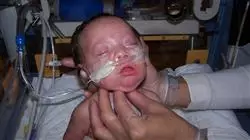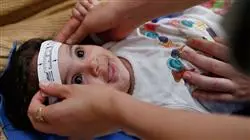University certificate
The world's largest faculty of medicine”
Introduction to the Program
The Postgraduate diploma in Malformations, Chromosomal Alterations, and Neurosurgical Pathology in Pediatric Neurology comprises the most complete and up-to-date scientific program on the market”

General pediatricians cannot encompass the complexity of all pediatric subspecialties. As they progress in their development, each one of them acquires a specific body and entity to become its own specialty. In addition, the particularities of child development and its variability according to age and other factors do not allow neurologists for adults to cope with the existing demand.
All this, together with the great diversity and complexity of neurological disorders in childhood, means that more and more neuropediatric units are needed and the demand for highly trained professionals in this area is increasing. The weight of neuropediatrics within general pediatrics almost exceeds 25% of the overall demand in specialized care units in our country. This figure, together with the significant increase in overall pediatric demand and despite the current birth rate, suggests a significant increase in the coming years. More and more authors are reporting an increase in the diagnosis of various neurological pathologies typical of childhood, such as disorders within the autism spectrum, learning disabilities, and even neoplasms affecting the central nervous system. This is leading to the development of units structured on the basis of care processes oriented towards specific pathologies and therefore to a need for extremely high need specialization.
In many pediatric neurology units in our environment, subspecialties are being created in which professionals are monographically dedicated to an area within neuropediatrics. In this one, there is a certain tendency to assimilate to the adult neurology model. There are units of Learning Disorders, Developmental Disorders, Movement Disorders, Headaches, etc. The average age of specialists in Neuropediatrics in our country also deserves to be taken into account, since in the coming years many of the entrepreneurs in this area of Postgraduate diploma are expected to reach retirement age.
Improve your skills in Malformations, Chromosomal Alterations, and Neurosurgical Pathology in Pediatric Neurology”
This Postgraduate diploma in Malformations, Chromosomal Alterations, and Neurosurgical Pathology in Pediatric Neurology contains the most complete and up-to-date scientific program on the market. The most important features include:
- Clinical cases presented by experts in the different specialties. The graphic, schematic, and practical contents with which they are created provide scientific and practical information on the disciplines that are essential for professional practice
- Latest developments in Malformations, Chromosomal Alterations, and Neurosurgical Pathology in Pediatric Neurology
- An algorithm-based interactive learning system for decision-making in the clinical situations presented throughout the course
- Special emphasis on evidence-based medicine and research methodologies in Malformations, Chromosomal Alterations, and Neurosurgical Pathology in Pediatric Neurology
- Theoretical lessons, questions to the expert, debate forums on controversial topics, and individual reflection assignments
- Content that is accessible from any fixed or portable device with an Internet connection
This course may be the best investment you can make when choosing a refresher program, for two reasons: in addition to updating your knowledge in Malformations, Chromosomal Alterations, and Neurosurgical Pathology in Pediatric Neurology, you will obtain a qualification from TECH Global University"
The program’s teaching staff includes professionals from the sector who contribute their work experience to this educational program, as well as renowned specialists from leading societies and prestigious universities.
The multimedia content, developed with the latest educational technology, will provide the professional with situated and contextual learning, i.e., a simulated environment that will provide immersive education programmed to learn in real situations.
This program is designed around Problem-Based Learning, whereby the professional must try to solve the different professional practice situations that arise during the academic year For this purpose, the students will be assisted by an innovative interactive video system created by renowned and experienced experts.
Increase your decision-making confidence by updating your knowledge with this Postgraduate diploma in Malformations, Chromosomal Alterations, and Neurosurgical Pathology in Pediatric Neurology"

Don't miss the opportunity to update your knowledge in Malformations, Chromosomal Alterations, and Neurosurgical Pathology in Pediatric Neurologyto improve patient care"
Why study at TECH?
TECH is the world’s largest online university. With an impressive catalog of more than 14,000 university programs available in 11 languages, it is positioned as a leader in employability, with a 99% job placement rate. In addition, it relies on an enormous faculty of more than 6,000 professors of the highest international renown.

Study at the world's largest online university and guarantee your professional success. The future starts at TECH”
The world’s best online university according to FORBES
The prestigious Forbes magazine, specialized in business and finance, has highlighted TECH as “the world's best online university” This is what they have recently stated in an article in their digital edition in which they echo the success story of this institution, “thanks to the academic offer it provides, the selection of its teaching staff, and an innovative learning method aimed at educating the professionals of the future”
A revolutionary study method, a cutting-edge faculty and a practical focus: the key to TECH's success.
The most complete study plans on the university scene
TECH offers the most complete study plans on the university scene, with syllabuses that cover fundamental concepts and, at the same time, the main scientific advances in their specific scientific areas. In addition, these programs are continuously being updated to guarantee students the academic vanguard and the most in-demand professional skills. In this way, the university's qualifications provide its graduates with a significant advantage to propel their careers to success.
TECH offers the most comprehensive and intensive study plans on the current university scene.
A world-class teaching staff
TECH's teaching staff is made up of more than 6,000 professors with the highest international recognition. Professors, researchers and top executives of multinational companies, including Isaiah Covington, performance coach of the Boston Celtics; Magda Romanska, principal investigator at Harvard MetaLAB; Ignacio Wistumba, chairman of the department of translational molecular pathology at MD Anderson Cancer Center; and D.W. Pine, creative director of TIME magazine, among others.
Internationally renowned experts, specialized in different branches of Health, Technology, Communication and Business, form part of the TECH faculty.
A unique learning method
TECH is the first university to use Relearning in all its programs. It is the best online learning methodology, accredited with international teaching quality certifications, provided by prestigious educational agencies. In addition, this disruptive educational model is complemented with the “Case Method”, thereby setting up a unique online teaching strategy. Innovative teaching resources are also implemented, including detailed videos, infographics and interactive summaries.
TECH combines Relearning and the Case Method in all its university programs to guarantee excellent theoretical and practical learning, studying whenever and wherever you want.
The world's largest online university
TECH is the world’s largest online university. We are the largest educational institution, with the best and widest online educational catalog, one hundred percent online and covering the vast majority of areas of knowledge. We offer a large selection of our own degrees and accredited online undergraduate and postgraduate degrees. In total, more than 14,000 university degrees, in eleven different languages, make us the largest educational largest in the world.
TECH has the world's most extensive catalog of academic and official programs, available in more than 11 languages.
Google Premier Partner
The American technology giant has awarded TECH the Google Google Premier Partner badge. This award, which is only available to 3% of the world's companies, highlights the efficient, flexible and tailored experience that this university provides to students. The recognition as a Google Premier Partner not only accredits the maximum rigor, performance and investment in TECH's digital infrastructures, but also places this university as one of the world's leading technology companies.
Google has positioned TECH in the top 3% of the world's most important technology companies by awarding it its Google Premier Partner badge.
The official online university of the NBA
TECH is the official online university of the NBA. Thanks to our agreement with the biggest league in basketball, we offer our students exclusive university programs, as well as a wide variety of educational resources focused on the business of the league and other areas of the sports industry. Each program is made up of a uniquely designed syllabus and features exceptional guest hosts: professionals with a distinguished sports background who will offer their expertise on the most relevant topics.
TECH has been selected by the NBA, the world's top basketball league, as its official online university.
The top-rated university by its students
Students have positioned TECH as the world's top-rated university on the main review websites, with a highest rating of 4.9 out of 5, obtained from more than 1,000 reviews. These results consolidate TECH as the benchmark university institution at an international level, reflecting the excellence and positive impact of its educational model.” reflecting the excellence and positive impact of its educational model.”
TECH is the world’s top-rated university by its students.
Leaders in employability
TECH has managed to become the leading university in employability. 99% of its students obtain jobs in the academic field they have studied, within one year of completing any of the university's programs. A similar number achieve immediate career enhancement. All this thanks to a study methodology that bases its effectiveness on the acquisition of practical skills, which are absolutely necessary for professional development.
99% of TECH graduates find a job within a year of completing their studies.
Postgraduate Diploma in Malformations, Chromosomal Alterations and Neurosurgical Pathology in Pediatric Neurology
In pediatric neurology, there are several conditions that can affect the development and function of the central nervous system in children.
Study the Specialized Pediatric Neurology Research Program
Participate in research studies in neurology and present them in specialized publications and conferences, this will allow you to have a greater understanding of the constant evolution of specific findings for this specialty.
Brain malformations: These are abnormalities in the development of brain structure that can affect the shape, size and function of the brain. Some brain malformations may be detected during pregnancy or shortly after birth.
Chromosomal alterations: alterations in the number or structure of chromosomes can result in genetic disorders, which can affect the central nervous system. Examples of these disorders include Down syndrome and Turner syndrome.
Neurocutaneous disorders: These are disorders that affect both the skin and the central nervous system. Examples of neurocutaneous disorders include tuberous sclerosis and Sturge-Weber syndrome.
Neurodegenerative disorders: these are progressive diseases in which nerve cells deteriorate and die over time. Examples of neurodegenerative disorders in childhood include juvenile Huntington's disease and spinal muscular atrophy.
Brain tumors: are abnormal growths of cells in the brain that may be cancerous or noncancerous. Brain tumors can affect brain function and may require complex treatment.
Treatment for these conditions may include medications, therapy, surgery and other treatments depending on the type of disorder and the patient's individual needs. It is important that children with neurological problems receive specialized care from experts in the field.
Enroll right now and start your specialization with our intensive education program to become an expert in malformations, chromosomal alterations and neurosurgical pathologies in pediatric neurology, we guarantee a solid and high-quality education in medicine, specialized training in pediatric neurology, continuing education.







